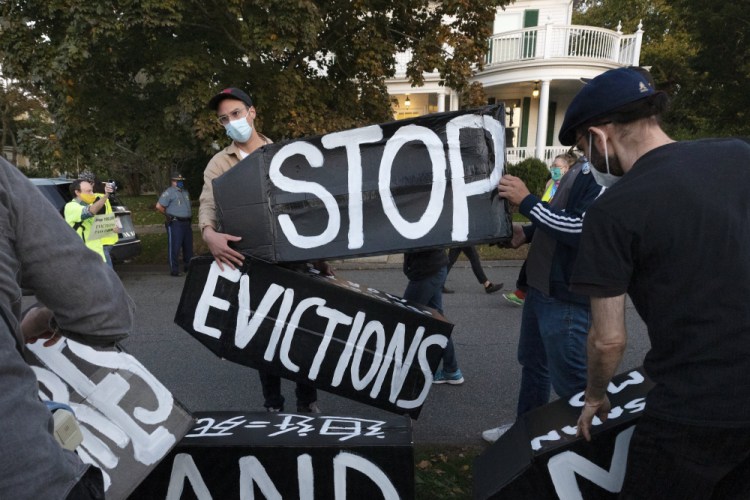A federal freeze on most evictions enacted last year is scheduled to expire July 31, after the Biden administration extended the date by a month.
The moratorium, put in place by the Centers for Disease Control and Prevention in September, was the only tool keeping millions of tenants in their homes. Many of them lost jobs during the coronavirus pandemic and had fallen months behind on their rent.
Landlords successfully challenged the order in court, arguing they also had bills to pay. They pointed out that tenants could access more than $45 billion in federal money set aside to help pay rents and related expenses.
Advocates for tenants say the distribution of the money has been slow and that more time is needed to distribute it and repay landlords. Without an extension, they feared a spike in evictions and lawsuits seeking to boot out tenants who are behind on their rents.
As of June 7, roughly 3.2 million people in the U.S. said they face eviction in the next two months, according to the U.S. Census Bureau’s Household Pulse Survey. The survey measures the social and economic effects of the coronavirus pandemic every two weeks through online responses from a representative sample of U.S. households.
Here’s the situation in Maine:
WHAT’S THE STATUS OF EVICTION MORATORIUMS IN THE STATE?
Maine never had a moratorium on evictions at the state level. However, courts were closed early in the pandemic and that delayed most evictions except during emergency situations. Court rules banned most evictions in mid-March, 2020, and those rules stayed in effect until Aug. 1. People can now be evicted for reasons other than back rent.
WHAT’S BEING DONE TO HELP PEOPLE FACING EVICTION?
There were several iterations of rent relief in Maine. Gov. Janet Mills and MaineHousing created a $5 million rent-relief program in April 2020, offering a direct payment of up to $500 paid directly to landlords for tenants meeting certain criteria. On July 30, 2020, Mills extended that program through the end of the year, providing up to $1,000 per month for tenants who met certain income-based eligibility requirements. On Dec. 31, the rent assistance all came to an end. But it restarted on March 1 with the benefit of $200 million provided by Congress. The state is awaiting an additional $150 million in federal relief.
In Maine, the rental assistance is distributed by MaineHousing through community action programs. There have been some notable delays processing applications in some places.
HOW ARE THE COURTS HANDLING EVICTION HEARINGS?
Eviction hearings in Maine continue to be held remotely and the state appears to have had fewer evictions than some other states. There has been no pandemic spike in evictions even though evictions are now proceeding, said Greg Payne, director of the Maine Affordable Housing Coalition. There’s no firm count on the total number of evictions during the pandemic. But Maine court data indicates there were 28 percent fewer eviction filings in the 2020 fiscal year compared to the previous year.
WHAT IS THE AFFORDABILITY IN THE STATE’S MAJOR RENTAL MARKETS?
Maine’s urban centers are facing a housing crunch, and some places, including Portland, have extremely tight real estate markets. The Maine Association of Realtors reports that median home values grew by double digits every month starting in July 2020. Statewide, the increase was 28 percent per the latest data available in May. The median value of a home in the state’s most populous county, Cumberland, was $330,00 in March 2020 and grew to $433,750 by May 2021.
ARE EVICTIONS EXPECTED TO CREATE A SURGE IN HOMELESSNESS?
It’s hard to say how much homelessness will increase in Maine. But that’s a worry and shelters have been busy during the pandemic. A bill that was just approved in the Maine Legislature requires MaineHousing to partner with Pine Tree Legal Assistance to ensure every tenant understands their rights and the eviction process and, if eligible, receives rental assistance. It also requires landlords to provide a form to tenants explaining their rights. The governor signed the bill into law.
Send questions/comments to the editors.



Success. Please wait for the page to reload. If the page does not reload within 5 seconds, please refresh the page.
Enter your email and password to access comments.
Hi, to comment on stories you must . This profile is in addition to your subscription and website login.
Already have a commenting profile? .
Invalid username/password.
Please check your email to confirm and complete your registration.
Only subscribers are eligible to post comments. Please subscribe or login first for digital access. Here’s why.
Use the form below to reset your password. When you've submitted your account email, we will send an email with a reset code.